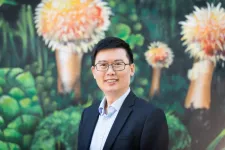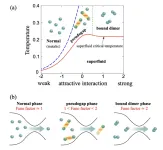How do microbes live off light?
Mechanism of light-to-energy conversion in many aquatic microbes more complex than was previously known, Technion researchers discover
2023-03-07
(Press-News.org)
Plants convert light into a form of energy that they can use – a molecule called adenosine triphosphate (ATP) – through photosynthesis. This is a complex process that also produces sugar, which the plant can use for energy later, and oxygen. Some bacteria that live in the light-exposed layers of water sources can also convert light to ATP, but the process they use is simpler and less efficient than photosynthesis. Nonetheless, Technion - Israel Institute of Technology researchers now find this process isn’t as straightforward and limited as was previously thought.
Rhodopsins are the light-driven proton pumps that bacteria employ to produce ATP. Whereas photosynthesis is a process that involves multiple stages and proteins, the rhodopsin performs everything itself. It is not more efficient, but rather it is like the difference between a medieval workshop and a modern factory. The rhodopsins are activated by a molecule called “retinal,” which absorbs light. Specifically, in these proteins retinal absorbs green light. A different molecule, a carotenoid “antenna,” can enable it to also absorb blue light as well, increasing the amount of energy the rhodopsin can produce.
However, these antennae have so far been found only in two rare bacteria species, whereas half the bacteria living in ocean and lake surfaces contains a rhodopsin gene.
To graduate student Ariel Chazan, working under the supervision of Professor Oded Béjà from the Technion Faculty of Biology, this seemed strange. Being able to absorb light in the blue range is advantageous, as blue light penetrates deeper into the water. And carotenoids are widely available in nature. Could it be that a helpful tool would be lying around, and no bacteria would pick it up? Mr. Chazan hypothesized that rather, the antennae used by many bacteria have not yet been discovered. And he set out to find them.
How do you find a molecule without knowing what exactly you’re looking for? Mr. Chazan went fishing. He collected water from Lake Kinneret, and isolated known rhodopsin proton-pumps. Then he used them as bait to fish for potential antennae in the same water. Molecules that got attached to the rhodopsins and increased their energy output under blue light were the ones he was looking for. He found many. Many variants of molecules that scientists had not been familiar with in the context of rhodopsins, and that microbes were apparently using to generate more energy from the light they were exposed to.
It is one thing for something to occur in Lake Kinneret. But if the same thing occurs in oceans all across the world, that’s groundbreaking. Mr. Chazan proceeded therefore to perform the same experiments on ocean water. He was also working to prove something else as well: that the molecules he found were effective rhodopsin-antennae not only in a test tube, but also inside the living cells. All experiments proved positive.
“This is new knowledge about the primary producers on earth – the organisms that produce energy available to living things from inorganic energy sources. Other organisms eat those, and so use the energy that’s already in the system. So, we found out that more energy is entering the food chain than was previously known,” Mr. Chazan said, explaining the importance of his discovery. The scientific community is in agreement that this study has far-reaching implications, and it was recently published in Nature.
The work was performed by an international team, including groups from Japan, Spain and Israel. The “fishing” methodology Mr. Chazan used is an old one, almost an outdated one. “People were a little sceptical when I proposed it,” he said. “But I like applying existing techniques in ways they weren’t used before. We shouldn’t forget old tools just because there’s something newer and shinier in our toolbox. Going out into the field, seeing what nature gives us, takes more effort than ordering clean industrially produced kits and doing everything in the lab. But those sterile kits are farther away from the nature we wish to study, and things get lost in the transition.”
END
ELSE PRESS RELEASES FROM THIS DATE:
2023-03-07
1. Commercial water purification system may have caused pathogen infection in 4 hospitalized patients
Abstract: https://www.acpjournals.org/doi/10.7326/M22-3306
URL goes live when the embargo lifts
A study of 4 cardiac surgery patients in one hospital found that they developed Mycobacterium abscessus infections, a multidrug-resistant nontuberculous mycobacteria, potentially due to a commercial water purifier. The water purifier had been installed in the hospital to improve water palatability but was inadvertently removing chlorine from the supply lines feeding ice and water machines in the affected area of ...
2023-03-07
B. Hadley Wilson, MD, FACC, is the new president of the American College of Cardiology. Today marks the first day of his one-year term leading the global cardiovascular organization in its mission to transform cardiovascular care and improve heart health.
“Some of the best qualities of the ACC and its members are the commitment to patient care and the shared vision of a world where science, innovation and knowledge optimize and transform cardiovascular care and outcomes for all,” Wilson said. “I believe we all really practice what we preach. I am honored to lead an organization dedicated to innovating ...
2023-03-07
Beginning today, Nicole L. Lohr, MD, PhD, FACC, will serve as chair of the American College of Cardiology Board of Governors (BOG) and secretary of the Board of Trustees. Her term will run one year from 2023-2024.
Lohr will lead governors from chapters representing all 50 states, the District of Columbia, Puerto Rico, Canada, Mexico and representatives from the U.S. health services. The BOG is the grassroots governing body of the ACC, a nonprofit cardiovascular medical society representing over 56,000 cardiologists and cardiovascular care team members around the world.
“I have spent the last 11 years finding ways to get involved in my ACC state chapter and in various ACC councils, ...
2023-03-07
Sexual minority families—where parental sexual orientation or gender identity is considered outside cultural, societal, or physiological norms—fare as well as, or better than, ‘traditional’ families with parents of the opposite sex, finds a pooled data analysis of the available evidence, published in the open access journal BMJ Global Health.
Parental sexual orientation isn’t an important determinant of children’s development, the analysis shows.
The number of children in families with lesbian, gay, bisexual, transgender ...
2023-03-07
Frequent socialising may extend the lifespan of older people, suggests a study of more than 28,000 Chinese people, published online in the Journal of Epidemiology & Community Health.
Socialising nearly every day seems to be the most beneficial for a long life, the findings suggest.
In 2017, 962 million people around the globe were over 60, and their number is projected to double by 2050. Consequently, considerable attention has focused on the concept of ‘active’ or ‘successful’ ageing, an important component of which seems to be an active social life, note the researchers.
But most of the evidence for the health benefits of socialising ...
2023-03-07
In a world first study of daily ambient fine particulate matter (PM2.5) across the globe, a Monash University study has found that only 0.18% of the global land area and 0.001% of the global population are exposed to levels of PM2.5 - the world’s leading environmental health risk factor – below levels of safety recommended by Word Health Organization (WHO). Importantly while daily levels have reduced in Europe and North America in the two decades to 2019, levels have increased Southern Asia, Australia, New Zealand, Latin America and the Caribbean, ...
2023-03-07
Annual damage caused by flooding in the UK could increase by more than a fifth over the next century due to climate change unless all international pledges to reduce carbon emissions are met, according to new research.
The study, led by the University of Bristol and global water risk modelling leader Fathom, reveals the first-ever dataset to assess flood hazard using the most recent Met Office climate projections which factor in the likely impact of climate change.
Its findings show the forecasted annual increase in national direct flood losses, defined as physical damage to property and businesses, due to climate change in the UK can be kept below 5% above recent historical levels. ...
2023-03-07
Astrophysicists in Australia have shed new light on the state of the universe 13 billion years ago by measuring the density of carbon in the gases surrounding ancient galaxies.
The study adds another piece to the puzzle of the history of the universe.
“We found that the fraction of carbon in warm gas increased rapidly about 13 billion years ago, which may be linked to large-scale heating of gas associated with the phenomenon known as the ‘Epoch of Reionisation’,” says Dr Rebecca Davies, ASTRO 3D Postdoctoral ...
2023-03-07
Cities are bursting with life, both human and animal. The smallest of them, insects, spiders, and ants are easily overseen, but their presence – or absence – in cities has wide-reaching effects. Scientists in Austria have published a study in Frontiers in Ecology and Evolution, which found a correlation between the presence of arthropods – invertebrate animals with an exoskeleton; among them are bees, insects, and spiders – and level of urbanization.
“We show that richness and diversity of arthropods on trees and bushes decreases along the rural-urban gradient,” said first author Dr Marion Chatelain, a postdoctoral ...
2023-03-07
If you cool down low-density atomic gas to ultralow temperatures (−273°C), you get a new state of matter called the Bose-Einstein Condensate (BEC). A BEC has strongly coupled two-atom molecules behaving like a collective wave following quantum mechanics. Now if you reduce the pairing strength between them—for example, by increasing the magnetic field—the atoms form “Cooper-pairs” according to Bardeen-Cooper-Schrieffer (BCS) theory—a Nobel Prize winner. The process is called BCS-BEC crossover. And the theory forms the basis ...
LAST 30 PRESS RELEASES:
[Press-News.org] How do microbes live off light?
Mechanism of light-to-energy conversion in many aquatic microbes more complex than was previously known, Technion researchers discover




